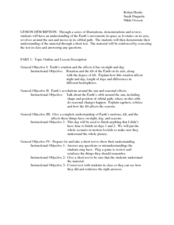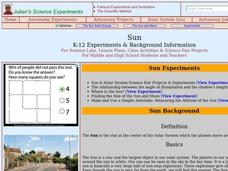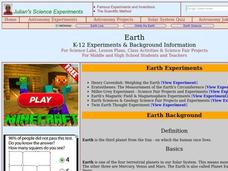Curated OER
Earth Rotation
Students examine the rotation of the Earth as it occurs in the 24 hour cycle. They use models of planets and the globe to make observations of movements made. Students brainstorm prior knowledge and then participate in a demonstration of...
Curated OER
Earth's Movement in Space
Students explain how the Earth's tilt and rotation causes night and day. For this earth science lesson, students determine how seasonal changes are caused by Earth's revolution. They play a jeopardy team game at the end of the unit to...
Curated OER
How Big Are Earth, Sun, and Moon?
Third graders draw what they believe is in space on a dry erase board. In groups, they are given a beaker half filled with water and they add a teaspoon of oil, observing the different layers that form. To end the lesson, they identify...
Curated OER
Science – Sun, Earth and the Moon
For this basic astronomy worksheet, learners respond to 20 true or false questions pertaining to the Earth, the Sun, and Earth's moon.
Curated OER
The Earth-Sun-Moon System
Third graders construct a model of the earth-sun-moon system using students as the sun, moon, and earth. They discuss ways that time is related to the movement of the earth and moon.
Curated OER
Sun too close? We'll just change Earth's orbit
Students study an article and discuss what would happen if the Earth's orbit changed. In this Earth's orbit lesson students answer a list of questions and complete an activity.
Core Knowledge Foundation
A Time for All Seasons - Summer
The sun is shining and the birds are singing, what better time to teach young learners about the fun season of summer. In this week-long science series, children learn how the rotation and orbit of the earth influence the days and...
Starry Night Education
The Year and Seasons
Turn your classroom into a live demonstration of how the earth and sun interact to create the four seasons. Using a globe, a light source, and a series of constellation cards, super scientists discover how the motion of these...
Core Knowledge Foundation
A Time for All Seasons - Fall
The weather is cooling down and the leaves are starting to change color; fall is right around the corner. Celebrate this special time of year with this earth and life science lesson series that teaches children about the causes of...
Curated OER
Tilted Earth
What causes Earth's seasons? Find out through a series of anticipatory questions, an easy yet powerful activity representing the sun-Earth system, a diagram to label, and follow-up questions. Dispel the misconceptions about Earth being...
Science 4 Inquiry
Phases of the Moon
The moon takes just over 27 days to orbit around Earth. Young scientists position themselves as the earth as they rotate around the sun and hold the moon. This allows them to observe the patterns and phases of the moon.
Curated OER
Sun
Students study how the sun is at the center of the solar system. In this solar lesson students measure the altitude of the sun and its size.
Curated OER
Earth
Students study the earth in relation to the solar system. In this planetary lesson plan students complete several investigations into the measurement of the earth and its magnetic field.
T. Smith Publishing
Earth
Young astronomers read an informational text passage and then answer questions based on what they read.
It's About Time
The History and Scale of the Solar System
Take scientists beyond our earthly reach and into the solar system. Pupils create a model of the solar system and discuss strengths and weaknesses of their model. They calculate distances in light years, discuss the nebular theory, and...
Laboratory for Atmospheric and Space Physics
Where Are We Going?
Come take a ride on the space bus! Scholars go on an imaginary trip to pick up their peers from the inner and outer planets while reinforcing math skills. First, learners round decimals to identify each planets' distance from Earth....
Curated OER
How Can a Spacecraft Always Face the Sun?
Students determine the correct orbital path for a satellite that collects data about the sun so that its view of the sun never be obstructed by the Earth.
Curated OER
What Orbital Dynamic Variables are Responsible for Earth's Weather?
Students explore the changing of the seasons. In this astronomy and seasons lesson, students construct a model of the revolution of the sun and the moon. Students compare the recorded solstice/equinox orbital positions and explain the...
Curated OER
View of a Comet from Earth
Students investigate comets. In this space science lesson, students study overhead transparencies of the orbits of Earth and a comet. Students identify various locations and times where comets would be visible from Earth.
Curated OER
The Dawn Mission: Ion Rockets and Spiral Orbits
In this ion rocket and orbits learning exercise, students read about the spiral orbit the Dawn spacecraft took due to its ion rocket motor. Students solve 3 problems including finding the path taken by the spacecraft, determining the...
Curated OER
Day and Night
Fifth graders investigate the Earth's rotation and revolution and the moon's orbit around the Earth. They participate in a class discussion about how night and day occur, and take notes. Next, they watch a video about the solar system...
Curated OER
Earth Turns? Prove It!
Students construct a pendulum using a washer and thin fishing line. In this earth science lesson, students simulate Earth's rotation using the pendulum bob and swivel chair. They explain how this activity proves that the Earth is indeed...
Curated OER
Earth's Seasons
Sixth graders review the relationship between the Sun and the Earth. In groups, they use a globe and flashlights to show the shadows on the Earth during the different seasons. To end the lesson plan, they write in their journals about...
Curated OER
Heating the Earth
Students explore how the angle of sunlight affects the Earth's temperature and seasons and then apply this understanding to their local situation.

























